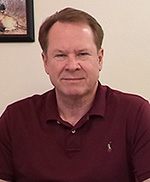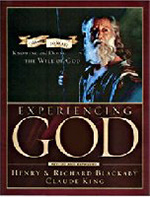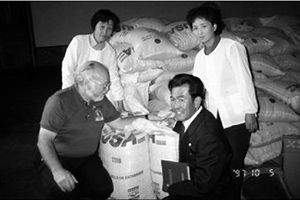TBM celebrates 50 years of responding to invitations from God
In five decades, Texas Baptist Men ministries expanded from two programs—men’s ministry and the Royal Ambassadors missions organization for boys—to 18 areas with a global reach.
 Mickey Lenamon“Our ministries have grown, but our mission hasn’t changed,” TBM Executive Director Mickey Lenamon said. “The mission of Texas Baptist Men is to bring people to Jesus.”
Mickey Lenamon“Our ministries have grown, but our mission hasn’t changed,” TBM Executive Director Mickey Lenamon said. “The mission of Texas Baptist Men is to bring people to Jesus.”
As TBM marks its 50th anniversary, some principles have remained constant, Lenamon insisted.
“We started as a volunteer organization, and we are still a volunteer organization,” he said, noting a small staff in Dallas coordinates the work of at least 20,000 volunteers around the state.
The early years
TBM grew out of the Brotherhood Department of the Baptist General Convention of Texas’ State Missions Commission. After messengers to the BGCT annual meeting approved a proposal for TBM’s creation as a self-governing organization, TBM’s founders met to adopt its constitution 50 years ago.
Even before TBM approved its governing documents, its volunteers blazed a trail for Baptists around the country through their involvement in disaster relief. When Hurricane Beulah hit the Rio Grande Valley, Baptist Men responded. Bob Dixon, the state RA director who went on to serve 28 years as TBM executive director, cooked meals for storm victims using buddy burners—small camp stoves RAs learned to make in summer camp using gallon-sized cans.
In 1970, TBM took the lead in coordinating the disaster response after Hurricane Celia struck, and that experience demonstrated the need for a mobile field kitchen. So, John LaNoue—who built the first mobile clinic for Texas Baptists’ River Ministry when he served as Baptist Student Union director at Kilgore College—designed a trailer that could house the field kitchen equipment, a communications center, bunks for volunteers and essential equipment for disaster relief.
Using funds provided through the Mary Hill Davis Offering for Texas Missions, LaNoue and other volunteers then built Baptists’ first disaster relief mobile unit in the rear driveway of his Mesquite home.
Today, TBM operates a fleet of fully equipped disaster relief vehicles and can call upon more than 10,000 trained disaster relief volunteers across the state.
Join in God’s activity
Don Gibson, who retired last year as TBM executive director but continues to work as a volunteer in restorative justice ministry, often noted the missions organization underwent a major change after Henry Blackaby—then a director of missions in Vancouver, British Columbia—spoke at the group’s annual convention in 1987.
 Blackaby described the importance of looking to see where God is at work and making radical adjustments to follow God’s will—a concept he and Claude King later developed into a best-selling interactive workbook, Experiencing God: Knowing and Doing the Will of God.
Blackaby described the importance of looking to see where God is at work and making radical adjustments to follow God’s will—a concept he and Claude King later developed into a best-selling interactive workbook, Experiencing God: Knowing and Doing the Will of God.
When TBM began applying the principles Blackaby outlined, the organization shifted from a program-driven approach to ministry and began instead responding to “invitations to join in the activity of God,” and doors of opportunity opened, Gibson often said.
Open doors of opportunity
 John LaNoue spent three months in North Korea in 1997 as part of a small team of nongovernmental organization representatives who monitored the distribution of food provided by humanitarian organizations in the United States. (File Photo)Particularly because of the organization’s pioneering work in disaster relief, doors opened for TBM to minister in places closed to traditional missions workers—North Korea, Iran, Iraq and Cuba, to name just a few.
John LaNoue spent three months in North Korea in 1997 as part of a small team of nongovernmental organization representatives who monitored the distribution of food provided by humanitarian organizations in the United States. (File Photo)Particularly because of the organization’s pioneering work in disaster relief, doors opened for TBM to minister in places closed to traditional missions workers—North Korea, Iran, Iraq and Cuba, to name just a few.
This year, the missions organization assumes responsibility for a ministry handled in recent years by the Baptist General Convention of Texas and its Executive Board staff—long-term disaster recovery.
“This will give us even more opportunities for hands-on contact with the people we want to help,” said John Travis Smith, TBM’s chief operating officer. “In fits with an overall trend in disaster relief. We’re not doing as much mass feeding as in the past, but we’re doing more hands-on work that puts us in direct contact with recipients of the ministry.”
In past disasters, TBM volunteers in field kitchens prepared tens of thousands of meals the American Red Cross delivered to displaced people. While TBM continues to provide meals, typically on a somewhat smaller scale, more disaster relief volunteers are involved in ministries such as volunteer chaplaincy, box distribution and mud-out after floods, and ash-out after fires, Smith noted.
Growth and expansion
Other TBM programs such as volunteer builders, RAs and restorative justice ministry also have flourished, and as the ministries expanded, TBM growth outpaced the ability of the BGCT to provide all its financial needs.
Although the BGCT remains the largest single source of funding for TBM, the state convention provides a relatively small percentage of the missions organization’s annual operating budget. For the remainder, TBM depends on financial support from individuals and churches.
Lenamon particularly points to the TBM water ministry as an area of potentially exponential growth. In the last two decades, TBM has provided pure water to people in more than 70 countries. In addition to providing low-cost water purification systems, TBM has expanded the water ministry to include well-drilling, pump repair and training in health and hygiene.
“God has always opened the doors for us and allowed us to go in,” he said.
After 50 years, second- and third-generation participants in TBM are taking leadership roles, said Lenamon, who first became involved as an RA. He recalled attending various TBM events as a boy when his father, Joe Lenamon, was TBM president.
In the future, TBM will continue to provide avenues for members of Texas Baptist churches to serve in hands-on missions and ministry, he said. Beyond that, he hesitates to make specific predictions.
“I don’t want to limit God by my own small-minded thinking,” Lenamon said. “I just pray for God to show us what he wants us to do and give us the courage to do it. We are open to God’s calling.”
TBM will mark its 50th anniversary with a Feb. 17 “family reunion” dinner in Mesquite and an open house at the Robert E. Dixon Missions Equipping Center in Dallas from 10 a.m. to 2 p.m. Feb. 18. Reservations are requested, and seating is limited. For more information, click here.